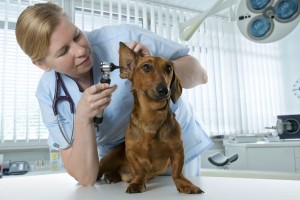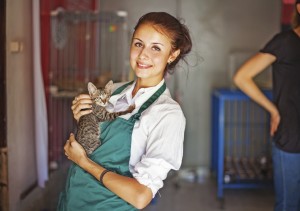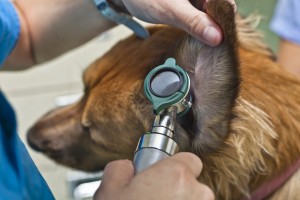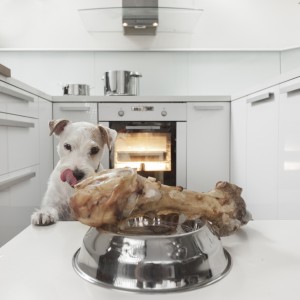Oakland Veterinary Referral Services Blog
Ear Polyps in Pets: What Pet Owners Need to Hear
 Most times an ear infection is a pretty easy problem to solve. Sometimes, though, we will run into an infection that won’t clear or that keeps on coming back. In this instance, it is likely that there is something going on that is predisposing that ear to have problems.
Most times an ear infection is a pretty easy problem to solve. Sometimes, though, we will run into an infection that won’t clear or that keeps on coming back. In this instance, it is likely that there is something going on that is predisposing that ear to have problems.
One of the more common diagnoses in complicated ear infections in pets are ear polyps. Find out what you need to know about ear polyps in pets and how they affect your animal. Continue…
Giving Back: Volunteering and Donating to Animal Shelters & Nonprofits
 After the holidays, when we are reminded of all of the wonderful things we have to be grateful for in our lives, we are often compelled to add “helping others” or volunteering to our list of new year’s resolutions.
After the holidays, when we are reminded of all of the wonderful things we have to be grateful for in our lives, we are often compelled to add “helping others” or volunteering to our list of new year’s resolutions.
Maybe this is true for you and your family, and you are currently looking for great missions to assist in the coming year?
For those of us who adore and care for pets, animal charities, shelters, and rescues seem to be the right choice for our philanthropic efforts. Whether you choose to give your time in the form of hands-on work or are gifting a favorite cause with a monthly donation, by donating to animal shelters you help the animal nonprofits that rely on the generosity of friends like you. Continue…
Portosystemic Shunts and Your Pet
 Portosystemic shunts (PSS), or liver shunts, are an abnormality in a pet’s blood flow through the liver. The liver normally filters toxins and impurities from the bloodstream. In a pet with a PSS, though, an extra blood vessel allows the blood to skip circulation through the liver. This prevents proper cleansing of potentially harmful substances from the body.
Portosystemic shunts (PSS), or liver shunts, are an abnormality in a pet’s blood flow through the liver. The liver normally filters toxins and impurities from the bloodstream. In a pet with a PSS, though, an extra blood vessel allows the blood to skip circulation through the liver. This prevents proper cleansing of potentially harmful substances from the body.
As you can imagine, a PSS can result in some pretty serious consequences. At Oakland Veterinary Referral Services, we are able to accurately diagnose and treat liver shunts medically as well as surgically. Continue…
All Ears: Veterinary Otoscopy
 Looking at your pet’s ears is a standard part of a routine wellness exam and can be a valuable diagnostic and treatment modality. Most people have had their own ears examined at some point with a device called an “otoscope,” a hand-held tool that allows visualization of the ear canal and ear drum. The process isn’t much different for pets.
Looking at your pet’s ears is a standard part of a routine wellness exam and can be a valuable diagnostic and treatment modality. Most people have had their own ears examined at some point with a device called an “otoscope,” a hand-held tool that allows visualization of the ear canal and ear drum. The process isn’t much different for pets.
However, when there is an escalation in your pet’s condition, or a standard otoscope evaluation isn’t giving the results needed, your vet may refer you to us for video otoscopy. This is cutting-edge technology that allows us to practice the very best medicine at OVRS. Continue…
Ring In The New Year With OVRS’ Top 10 Blogs of 2014!
 We are downright giddy at all we’ve collectively accomplished during this landmark year and hope you have been well-served by our staff. We like to extend our service to you at home through our blog and value the time you spend reading it. Please feel free to peruse the Top 10 blogs viewed by our valued readers in 2014: Continue…
We are downright giddy at all we’ve collectively accomplished during this landmark year and hope you have been well-served by our staff. We like to extend our service to you at home through our blog and value the time you spend reading it. Please feel free to peruse the Top 10 blogs viewed by our valued readers in 2014: Continue…
Starting the New Year Right with Winter Wellness for Your Pet
 It seems like from the time we carve the Halloween pumpkins to the time we bid farewell to another year at a festive party (or in our jammies), our attention and time is maxed out with the winter holidays and all the tasks they bring. Because of this, it’s no wonder we sometimes forget a follow-up wellness appointment for our cat or that extra walk to the park we promised our dog.
It seems like from the time we carve the Halloween pumpkins to the time we bid farewell to another year at a festive party (or in our jammies), our attention and time is maxed out with the winter holidays and all the tasks they bring. Because of this, it’s no wonder we sometimes forget a follow-up wellness appointment for our cat or that extra walk to the park we promised our dog.
The holidays have a way of overtaking our attention, but the New Year can bring many opportunities for improving the quality of life for that pet who gives you so much love year-round. Here are a few ideas…. Continue…
All Dressed Up: How to Choose Pet Clothes
 Shopping for new duds always gains momentum during winter – but these days clothes shopping is not just for people. Pet wear and pet fashion have evolved tremendously, and there’s no shortage of sassy sweaters and cunning coats to choose from. In fact, the variety is so immense, it can be downright overwhelming trying to find the right clothing to best protect your pet from maladies like hypothermia. From patterned microfiber jackets to Welsh knit sweaters; how can you tell what is useful when it comes to pet clothes versus just fun novelty wear? Much less know how to get the right fit?
Shopping for new duds always gains momentum during winter – but these days clothes shopping is not just for people. Pet wear and pet fashion have evolved tremendously, and there’s no shortage of sassy sweaters and cunning coats to choose from. In fact, the variety is so immense, it can be downright overwhelming trying to find the right clothing to best protect your pet from maladies like hypothermia. From patterned microfiber jackets to Welsh knit sweaters; how can you tell what is useful when it comes to pet clothes versus just fun novelty wear? Much less know how to get the right fit?
That’s where we come in…
The Birthday Suit
Assuming that you’re not the proud pet parent of a Husky, Malamute, or Saint Bernard, it’s likely that your pet may be a wee bit chilly in his or her birthday suit this time of year. If you’re unsure whether your pet could benefit from bundling up in some winter weather pet gear, consider these questions: Continue…
Barking Up The Right Tree: The Best Pet Presents
 Your pet may not need or appreciate a new LED TV, golf clubs, or the newest best-seller, but there are lots of things you can give your pet this holiday season to show your love and affection. Your friends at Oakland Veterinary Referral Services have put together some ideas to get the ball rolling towards the best holiday your pet has ever had.
Your pet may not need or appreciate a new LED TV, golf clubs, or the newest best-seller, but there are lots of things you can give your pet this holiday season to show your love and affection. Your friends at Oakland Veterinary Referral Services have put together some ideas to get the ball rolling towards the best holiday your pet has ever had.
In The Kitchen
Your pet’s meal time is truly important, so why not ship out the old dishes your pet has been eating out of since infancy? Personalizing a new food and water bowl or upgrading to a new water fountain that filters and circulates drinking water are wonderful ways to show you care. Your pet may value a new platform that raises the level at which he or she eats. Continue…
December Holiday Decoration DON’Ts – What Every Pet Parent Should Know
 So, now that Halloween has come and gone and the turkey and gravy have been feasted upon, it’s time to break out those boxes in the garage and decorate! It is a common scene after Thanksgiving: the stringing of lights and the decking of halls… But, like other holidays, if you share your home with a cherished pet, you’d better keep a keen eye on your fur buddy around the bedazzling display of holiday décor.
So, now that Halloween has come and gone and the turkey and gravy have been feasted upon, it’s time to break out those boxes in the garage and decorate! It is a common scene after Thanksgiving: the stringing of lights and the decking of halls… But, like other holidays, if you share your home with a cherished pet, you’d better keep a keen eye on your fur buddy around the bedazzling display of holiday décor.
On the Tree
The ideal way to protect your pet from the perils of the Christmas tree is to simply keep your four-legged friend away from the tree unless you or a family member are present. If that’s impossible, keep lower branches somewhat bare or opt for unbreakable, large ornaments at your pet’s level.
No one likes to deal with a downed tree after a rowdy game of chase (we suggest anchoring it), or a favorite ornament lying broken on the floor (a tempting toy for your feline), there are a few decorations that can create real emergencies for our pets. Continue…
Serious Thanksgiving Food Risks For Your Pets
We all look forward to the holiday season as a time of family, friends, food, and fun. Unfortunately, though, Thanksgiving is also a time where we see a dramatic increase in the number of pet emergencies.
Be sure to be aware of potential Thanksgiving food risks and keep your pet safe this holiday season.
Pancreatitis in Pets
Just as for people, overindulgence in rich, fatty foods can upset the digestive system, resulting in vomiting, diarrhea, or both. Sometimes, though, when pets indulge too much the result is something more serious than just a tummy ache. Continue…



